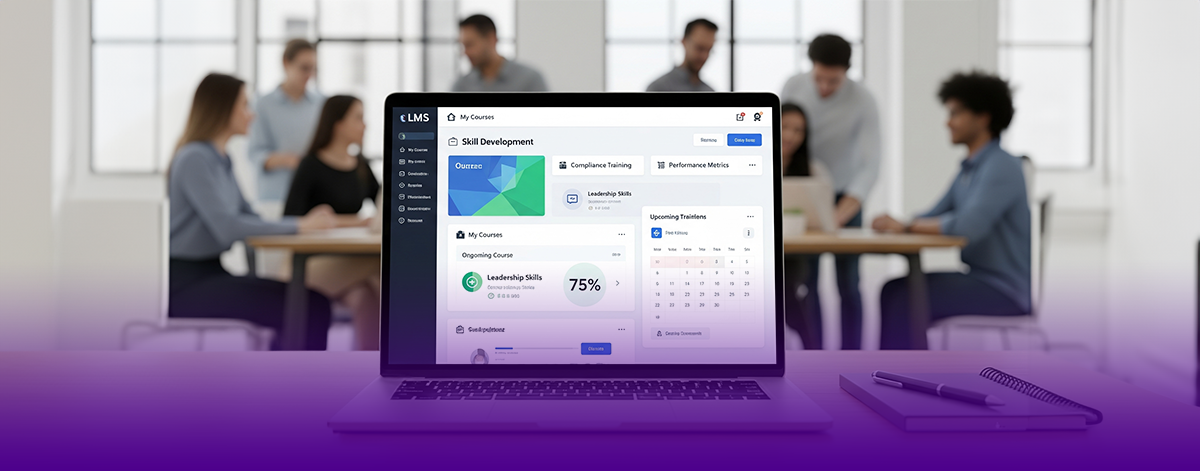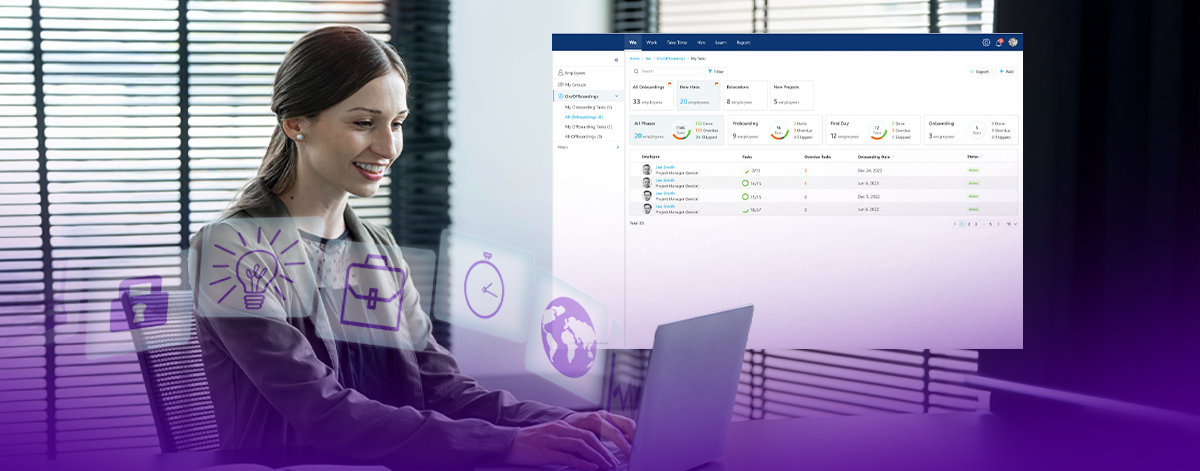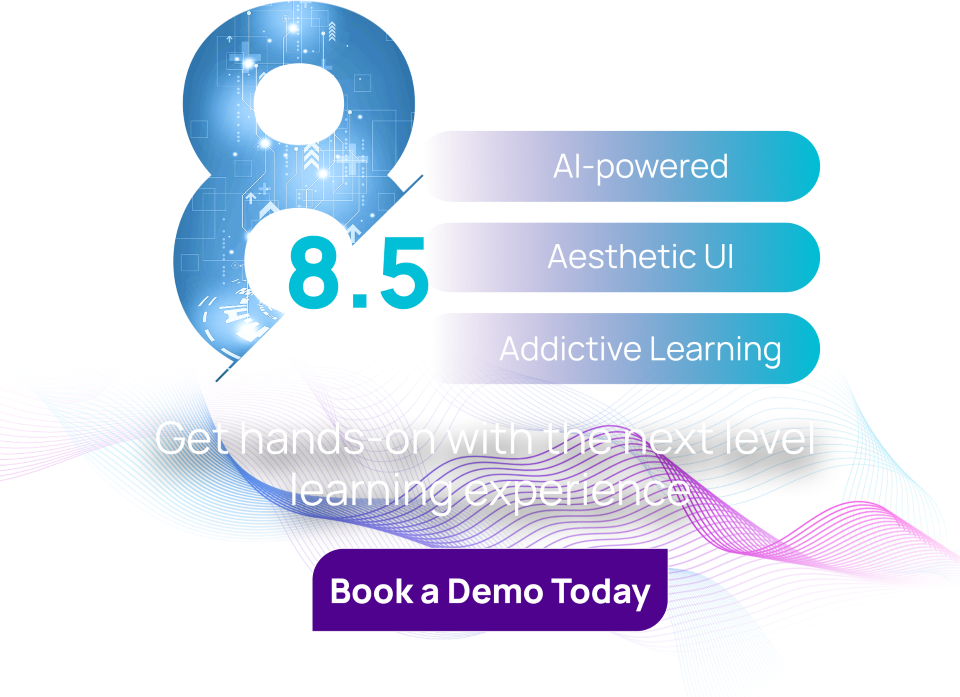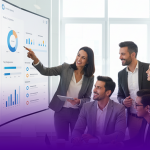
Top LMS Platforms in 2025: Which One Fits Your Needs?
October 10, 2025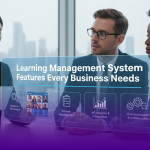
Learning Management System Features Every Business Needs
October 10, 2025Employee training has come a long way from the days of classroom sessions and thick training manuals. In today’s fast-paced business environment, learning needs to be more agile, scalable, and measurable.
Far from being just a storage space for courses, the corporate LMS have evolved into a central hub for employee development. This platform connects learning with performance and ensures organizations stay future-ready.
Let’s take a closer look at what a corporate LMS is, why it matters for modern businesses, and how it’s shaping the future of workforce development.
What is a corporate LMS?
A corporate LMS (learning management system) is a software platform that organizations use to create, deliver, and track training programs. But it’s not just about distributing courses. A corporate LMS integrates with HR systems, performance management tools, and communication platforms to make learning a seamless part of everyday work.
Think of it as your company’s learning backbone where onboarding, compliance, skills training, and leadership development connect in one place. Unlike consumer learning platforms , a workplace LMS is designed with business needs in mind, ensuring that training efforts are measurable and aligned with organizational goals.
How does a corporate LMS transform employee learning?
The strength of a corporate LMS lies in the many ways it supports workforce development.
- Onboarding and role-readiness: A corporate LMS speeds up onboarding by guiding your employees through role-specific learning paths that make new employees productive faster.
- Compliance and risk moderation: For organizations in regulated industries, a corporate LMS simplifies compliance by automatically assigning mandatory courses and generating audit-ready reports. Additionally, the LMS automates certification renewal.
- Skill-based development: Workplace LMS Maps courses to competency frameworks and skill taxonomies. It supports personalized learning plans tied to career paths and role requirements.
- Continuous skill-building: Employees can follow learning journeys tailored to their career aspirations while managers gain insights into who’s ready for promotion, who needs reskilling, and where the talent gaps lie.
- Sales, product, and technical enablement: A corporate LMS ensures that everyone is up to date with the latest tools, features, and customer strategies, boosting both confidence and results.
At its best, an LMS doesn’t just teach; it supports employees in the flow of work. Quick-access resources, searchable libraries, and performance support tools mean employees don’t have to wait for training sessions to find the answers they need. Learning becomes a natural extension of daily work.
Benefits of a corporate LMS for organizations
From the organization’s perspective, adopting corporate learning solutions through an LMS creates a measurable impact. It reduces administrative burden by automating routine tasks like enrollments and reminders, while detailed analytics help L&D leaders understand not just who completed training but how it influenced performance.
The scalability of a workplace LMS means global teams can receive consistent training customized for local languages and cultures. Personalized learning experiences enhanced by gamification and mobile access improve employee engagement and retention. And because learning can be closely aligned with business outcomes, organizations see clearer links between training and growth whether in higher sales, improved customer satisfaction, or better compliance rates.
The result? Learning is no longer just a support function; it becomes a driver of business value.
New trends L&D leaders can try with advanced LMS platforms
Modern corporate learning solutions are becoming increasingly intelligent, interactive, and learner-centric compared to just a few years ago. Here are some trends worth experimenting with:
- AI-driven personalization
One of the most exciting LMS features is personalization. Instead of presenting the same training catalog to everyone, modern LMS platforms recommend content based on an employee’s role, performance data, and learning preferences. This makes training more relevant and more likely to stick.
- Skills-first learning
Another decisive shift with LMS is organizations are now mapping content to competency frameworks so they can track actual skill growth rather than course completions. A workplace LMS that supports skill taxonomies gives organizations a sharper view of talent gaps and succession readiness.
- Microlearning and learning in the flow of work
These are also becoming mainstream. Employees don’t always have time for long courses, but short, focused modules integrated into tools like Teams or Slack make learning accessible when it matters most.
- VR simulations and branching scenarios
On the more immersive side, these corporate learning solutions help employees practice skills in safe, realistic environments.
- Analytics
And of course, learning analytics is becoming more sophisticated. Advanced dashboards combine learning data with performance metrics, giving leaders the ability to forecast workforce needs and prove learning ROI with confidence.
Best practices for corporate LMS success
While implementing a corporate LMS, the most successful organizations begin with clear goals such as reducing onboarding time, improving compliance rates, or building leadership pipelines. With these outcomes in mind, they design corporate learning solutions that map directly to skills and competencies.
- Integration is equally critical. When an LMS connects with HR systems and collaboration tools, it creates a smooth experience for employees and a single source of truth for data.
- Adoption also depends on simplicity. A user-friendly interface, intuitive dashboards, and personalized learning journeys encourage employees to return to the platform instead of seeing it as just another system to log into.
- Governance and inclusivity play a significant role. Learning content should be regularly updated, accessible to all employees, and localized for diverse teams. This ensures the LMS remains valuable and inclusive.
A few quick steps to ponder before implementing an LMS could be:
- Define clear outcomes. What problems are you solving with learning?
- Map training content to specific skills and competencies.
- Run small pilots, measure results, and scale gradually.
- Make integration a priority so the LMS talks to your HR, performance, and collaboration systems.
- Focus on user experience, simple dashboards, and role-based views to drive adoption.
- Set up governance so content stays accurate and up to date.
- Ensure accessibility and inclusivity for all employees.
Measuring the impact of corporate learning solutions
A question many organizations ask is: How do we know if our corporate learning solutions are really working?
With Tenneo, the answer is clear. Tenneo’s analytics help leaders move beyond vanity metrics to focus on business impact. Instead of just counting completions, organizations can track:
- Time-to-competency for key roles
- Performance improvements (like sales conversions or reduced errors)
- Internal mobility and skill acquisition rates
- Engagement and retention among trained cohorts
- Cost savings from digital-first, scalable training
Combining quantitative analytics with qualitative feedback (manager observations, learner reflections) gives a fuller picture of how a corporate LMS drives outcomes.
The future of workplace learning
The future of workplace learning centers on agility, skills intelligence, and human-centered design. A corporate LMS will increasingly focus on:
- Skills clouds and interoperability: Open standards and APIs that enable skills data to move between systems so organizations can build best-of-breed solutions.
- Federated learning ecosystems: Seamless access to internal, vendor, and partner content inside a single learning experience.
- AI assistants for coaching and content creation: Increasingly being used for automated coaching nudges, AI-created micro-content, and auto-generated assessments to scale L&D teams.
- Ethical and privacy-aware personalization: Personalized experiences that respect privacy and transparency, especially when linking learning to performance data.
- Augmented performance support: Quick, AI-powered job aids and searchable knowledge bases that reduce the need for the formal training of routine tasks.
Conclusion
A modern corporate LMS is a business accelerator. With Tenneo’s AI-powered platform, learning becomes more personalized, measurable, and directly tied to organizational success.
Looking to adopt a skills-first, fast, integrated LMS that will become an engine of growth for your organization? Reach out to Tenneo experts to explore a tailored learning management platform that evolves with your workforce.
